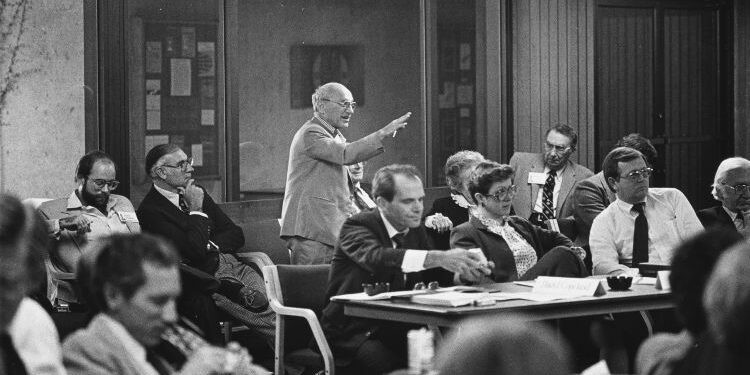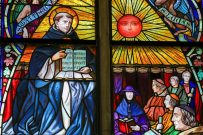A sound constitution encoded with classical liberal principles is an anchor for society—one that is hard to haul away and destroy.
Classical, New, or Conservative Liberalism?
Are American conservatives the real liberals? The question transcends semantics, for paradox is infused in America’s bloodstream, the Founders having been at once revolutionary and conservative. The War for Independence was fought not so much to reject the nation that gave the world representative government as to uphold that principle, which the colonists had accused their mother country of betraying. It was by invoking the English tradition that the Founders turned the tables on the British King and Parliament, charging them with violating its sacred values. This was no idle posturing. As Harvard Professor Louis Hartz observes in his seminal book The Liberal Tradition in America, “[a] series of circumstances had conspired to saturate even the revolutionary position of the Americans with the quality of traditionalism—to give them, indeed, the appearance of outraged reactionaries.”
But the irony didn’t end there: “America piled on top of this paradox another one of the opposite kind,” namely, the ineffable novelty of its enterprise. Hartz writes, “It had been a story of new beginnings, daring enterprises, and explicitly stated principles….The result was that the traditionalism of the Americans, like a pure freak of logic, often bore amazing marks of antihistorical rationalism.” Hartz is referring to the revolutionary constitutions of 1776 “which evoked, as [Benjamin] Franklin reported, the ‘rapture’ of European liberals everywhere.” The concept of a written constitution thus transcended even the British experience with common law liberalism, thereby becoming “the darling of the rationalists—a symbol of the emancipated mind at work.” The secular rationalists evidently failed to appreciate not only the Founders’ respect for experience and tradition but also their common embrace of Athens and Jerusalem, which they considered fully complementary.
That was how they understood the system of natural liberty. “Liberalism,” by contrast, is of recent vintage. Was the original commitment to what eighteenth-century British thinkers referred to as “the system of natural liberty” rationalist, traditionalist, conservative, radical, universalist, nationalist, democratic, individualistic? Clearly, or rather unclearly, it was none and all of the above. Eminently practical men, the Founders were convinced by facts that freedom is both efficient—that is, conducive to the maximum aggregate prosperity—and right. The impetus was thus profoundly moral and spiritual, based on the principle that each of us had been endowed by our Creator with unalienable rights. That we were all equally unequal—in talents, abilities, and personalities—was to them self-evident.
Over the course of many decades, however, this vision gradually eroded in America specifically, thanks to Progressives such as John Dewey and Woodrow Wilson. As early as 1927, Ludwig von Mises wrote in Liberalism in the Classical Tradition that “the doctrine of liberalism is different today from what it was [in the days of Adam Smith], even though its fundamental principles have remained unchanged.” Three and a half decades later, he would add in a second preface: “In the United States ‘liberal’ means today a set of ideas and political postulates that in every regard are the opposite of all that liberalism meant to the preceding generations.”
At the end of World War II, von Mises would join a group of like-minded economists and philosophers who took it upon themselves to address what they considered an existential threat to civilization from anti-liberal totalitarianism, whether of the Nazi or Communist variety, lest mankind self-destruct. Their deliberations would result in what came to be known as the Mont Pèlerin Society, the most distinguished member of what Matthew Continetti has called the “‘conservative movement’ [by which] I mean the network of institutions, publications, and individuals that sprang up in the middle of the 20th century to defend political and economic freedom against the challenges of bureaucratic centralism at home and Soviet totalitarianism abroad.”
Except that the Society’s very name deliberately avoided ideological labels, declaring itself committed to inquiry and discussion “among minds inspired by certain ideals and broad conceptions held in common, to contribute to the preservation and improvement of the free society.” Though principally devoted to defending free markets, it also denounced “the historical fatalism which believes in our power to discover laws of historical development which we must obey, and the historical relativism which denies all absolute moral standards and tends to justify any political means by the purposes at which it aims.” Put more succinctly, the target was progressivism and its ideological twins, whether situated on History’s putative right or left side, up or down, red-hued, black, or green. And no, its members emphatically refused to abandon the liberal label. They deeply resented its hijacking by ideologues committed to its erosion, if not its destruction on the road to serfdom.
So wrote one of the Society’s most dynamic organizers, the diminutive intellectual giant Milton Friedman, in his introduction to the Liberty Fund’s 1981 reprint of the New Individualist Review: “Two organizations in particular served to channel and direct [the post-World War II resurgence of interest in classical liberalism]: the Mont Pèlerin Society, founded in 1947 primarily as a result of the initiative of Friedrich Hayek, whose book The Road to Serfdom did so much to spark the resurgence; and the Intercollegiate Society of Individualists, founded in 1953 by Frank Chodorov, a freelance writer and journalist and a dedicated opponent of collectivism.”
To save civilization from its discontents, a return to the original liberalism respectful of both reason and sentiment, fact and faith, is this generation’s principal challenge.
Both Friedman and Hayek wrote essays titled “Why I am Not a Conservative.” The Austrian-born Hayek was especially loath to adopt a label that in Europe connoted a reactionary and mercantilist mindset, insisting that for his philosophy, “the rightful and proper label is liberalism.” In Capitalism and Freedom, Friedman identified with the nineteenth-century liberal who “was a radical, both in the etymological sense of going to the root of the matter, and in the political sense of favoring major changes in social institutions. So too must be his modern heir. We do not wish to conserve the state interventions that have interfered so greatly with our freedom, though, of course, we do wish to conserve those that have promoted it.” True liberal conservatives were never violent. But neither were they timorous and afraid of change—on the contrary, they embraced change, innovation, and inclusion, provided it was uncoerced. That proviso made all the difference.
In no way was Friedman’s idealism solipsistic, monadic, atomistic, or asocial. Quite the contrary: freedom, he insisted, only makes sense in relation to other people. Taking “the individual, or perhaps the family, as our ultimate goal in judging social arrangements,” freedom is meaningless on a solitary island. Political democracy, moreover, must not be understood merely as an electoral system, which is impractical except on a small scale—other arrangements require some sort of representation. Thus in many ways, the most democratic of social arrangements is actually the market, which serves as a sort of “system of proportional representation” that allows each person to “vote” for the goods he prefers and can afford. At bottom, “[p]olitical freedom means the absence of coercion of a man by his fellow men. The fundamental threat to freedom is the power to coerce, be it in the hands of a monarch, a dictator, an oligarchy, or a momentary majority.” That seems clear enough, no isms required.
Frank Chodorov fully agreed. The eleventh child of a Russian Jewish immigrant peddler in New York, Chodorov had started a new magazine in 1944, Analysis, which “looks at the current scene through the eyes of historic liberalism, unashamedly accepting the doctrine of natural rights, proclaims the dignity of the individual and denounces all forms of Statism as human slavery.” Throughout his quixotic career, Chodorov never abandoned that stance. For him, individualism was perfectly consistent with religious faith. He wondered “what will happen to the Judeo-Cristian tenet of the primacy of the person?… In the darkness and the stillness of universal Statism, will it be whispered that once there was a world built on the faith of the human being in himself and his God?”
That said, Chodorov, Hayek, or Milton Friedman would undoubtedly have had no objection to being included in an anthology compiled recently by Hannes H. Gissurarson, professor of political science at the University of Iceland, featuring two dozen theoreticians under the label “conservative liberalism.” Ranging from St. Thomas Aquinas to David Hume, Frédéric Bastiat to Edmund Burke, William Graham Sumner to Robert Nozick, the singularly motley crew nonetheless share a common vision: “While they may present various kinds of arguments for their positions, from divine command, human reason, social utility, natural evolution, moral intuition, and common consent, these positions are all in the end based on a choice, which is a commitment to, indeed a celebration of, Judeo-Christian Western civilization.”
Opposed to the rationalism of the French Revolution, most of those gathered at Mont Pèlerin agreed with Hayek that “true liberalism has no quarrel with religion. I can only deplore,” he would write later, “the militant and essentially illiberal antireligionism which animated so much of nineteenth-century Continental liberalism.” Rather, “what distinguishes the liberal from the conservative…is that, however profound his own spiritual beliefs, he will never regard himself as entitled to impose them on others and that for him the spiritual and the temporal are different spheres which ought not to be confused.” Jefferson, as well as Hamilton, would have cheered.
Louis Hartz describes this extraordinary outlook as Hebraism—which, unlike “Hebraic,” is not restricted to a sect or religion—intimating the idea of “the Chosen People.” For there is little doubt that Americans had believed themselves unique in a manner similar to the ancient Hebrews, not as recipients of extra largesse so much as being tasked with momentous responsibilities. They understood that treating one another with respect, in conformity with the supreme covenantal premise, was more likely to lead to peace and prosperity than if they did not. Falling so dismally short of that ideal by failing to outlaw slavery from the outset—admittedly a practical impossibility at the time—only confirmed the truth of this suspicion.
European rationalists, argues Hartz, had underestimated “the sober temper of the American revolutionary outlook [nurtured by] the high degree of religious diversity that prevailed in colonial life.” It was the same diversity implicit in the Torah’s injunction that humans spread across the globe and create many nations that, according to Hartz, “saturated the American sense of mission, not with a [neo-]Christian [post-Enlightenment] universalism, but with a curiously Hebraic kind of separatism.” Ironically, this attitude “inspired [Americans] with a peculiar sense of community that Europe had never known.…We are reminded again of Tocqueville’s statement: the Americans are ‘born equal.’” And also of the Torah, where we learn that humanity was saved after the flood, and from Noah’s descendants “the whole world branched out” across many lands “each with its language—their clans and their nations.” (Genesis 9-10)
Indeed, the paradox embraced by the system of natural liberty reflected, at bottom, the paradox of surviving in society: at once a monumental challenge and a salvation, it would test the limits of empathy. It takes but a modicum of common sense to grasp that loving oneself does not exclude loving others. Though egocentrism comes first—each baby instinctively oblivious to all but its own survival—maturity soon teaches the virtue of transcending oneself. The solipsist, a hapless Narcissus, sooner or later sinks into bottomless nihilism. But while the Greek mythological figure merely drowned himself, the psychopathic solipsist can drown an entire civilization. To save it from its discontents, a return to the original liberalism respectful of both reason and sentiment, fact and faith, is this generation’s principal challenge.



